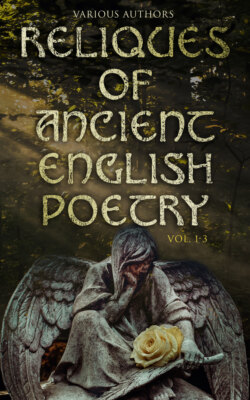Читать книгу Reliques of Ancient English Poetry (Vol. 1-3) - Various Authors - Страница 49
На сайте Литреса книга снята с продажи.
I.
ADAM BELL, CLYM OF THE CLOUGH, AND WILLIAM OF CLOUDESLEY,
ОглавлениеTable of Contents
Were three noted outlaws, whose skill in archery rendered them formerly as famous in the north of England, as Robin Hood and his fellows were in the midland counties. Their place of residence was in the forest of Englewood, not far from Carlisle (called corruptly in the ballad Englishwood, whereas Engle, or Ingle-wood, signifies wood for firing). At what time they lived does not appear. The author of the common ballad on "The Pedigree, Education and Marriage of Robin Hood," makes them contemporary with Robin Hood's father, in order to give him the honour of beating them, viz.:
"The father of Robin a Forester was,
and he shot in a lusty long-bow,
Two north-country miles and an inch at a shot,
as the Pinder of Wakefield does know:
For he brought Adam Bell, and Clim of the Clugh,
and William a Clowdéslee,
To shoot with our Forester for forty mark;
and the Forester beat them all three."
Collect. of Old Ballads, vol. i. (1723), p. 67.
This seems to prove that they were commonly thought to have lived before the popular hero of Sherwood.
Our northern archers were not unknown to their southern countrymen: their excellence at the long-bow is often alluded to by our ancient poets. Shakespeare, in his comedy of Much adoe about nothing, act i., makes Benedick confirm his resolves of not yielding to love, by this protestation, "If I do, hang me in a bottle like a cat,682 and shoot at me, and he that hits me, let him be clapt on the shoulder, and called Adam:" meaning Adam Bell, as Theobald rightly observes, who refers to one or two other passages in our old poets wherein he is mentioned. The Oxford editor has also well conjectured, that "Abraham Cupid" in Romeo and Juliet, act ii. sc. 1, should be "Adam Cupid," in allusion to our archer. Ben Jonson has mentioned Clym o' the Clough in his Alchemist, act i. sc. 2. And Sir William Davenant, in a mock poem of his, called "The long vacation in London," describes the Attorneys and Proctors, as making matches to meet in Finsbury fields.
"With loynes in canvas bow-case tyde:683 Where arrowes stick with mickle pride; … Like ghosts of Adam Bell and Clymme. Sol sets for fear they'l shoot at him."
Works, 1673, fol. p. 291.
I have only to add further concerning the principal hero of this Ballad, that the Bells were noted rogues in the North so late as the time of Q. Elizabeth. See in Rymer's Fœdera, a letter from lord William Howard to some of the officers of state, wherein he mentions them.
As for the following stanzas, which will be judged from the style, orthography, and numbers, to be of considerable antiquity, they were here given (corrected in some places by a MS. copy in the Editor's old folio) from a black-letter 4to. Imprinted at London in Lothburye by Wyllyam Copland (no date). That old quarto edition seems to be exactly followed in Pieces of Ancient Popular Poetry, &c. Lond. 1791,684 8vo., the variations from which that occur in the following copy, are selected from many others in the folio MS. above-mentioned, and when distinguished by the usual inverted 'comma,' have been assisted by conjecture.
In the same MS. this Ballad is followed by another, intitled Younge Cloudeslee, being a continuation of the present story, and reciting the adventures of Willian of Cloudesly's son: but greatly inferior to this both in merit and antiquity.
[The version here printed differs but slightly from the one in the Folio MS. (ed. Hales and Furnivall, 1868, vol. iii. p. 76), and as the latter is of no critical value it has been thought unnecessary to point out the various readings. A fragment of an older edition than Copland's mentioned above has been recovered by Mr. Payne Collier, which is attributed to the press of Wynkyn de Worde by Mr. W. C. Hazlitt.
This spirited ballad is mentioned by Laneham in his Catalogue of Captain Cox's ballads, and the various editions it has passed through, and the frequent references to it in literature, prove its great and deserved popularity.
The circumstances of the second Fit resemble closely the rescue of Robin Hood by Little John, as related in "Robin Hood and the Monk," and the incident of the shot at the apple in the third Fit bears a curious likeness to the very ancient myth which is associated with William Tell. "Allane Bell" is mentioned by Dunbar in company with Robin Hood, Guy of Gisborne, and others, which proves that in his time these names had become mere abstractions.]
